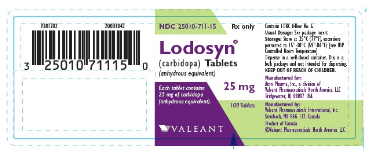This is an automatically translated article.
Levodopa is a drug commonly used in the treatment of Parkinson's disease. To increase the effectiveness of treatment and reduce side effects, patients can combine Levodopa with Carbidopa contained in the Masopen product. So what is Masopen and how is it used?1. What is Masopen?
Masopen is a combination product between two active ingredients, Levodopa and Carbidopa, with strengths such as 250/25, 100/25, 100/10 and 50/12.5.
Levodopa is a precursor of dopamine used as replacement therapy in the treatment of Parkinson's disease. The remaining ingredient in Masopen is Carbidopa, which is a peripheral decarboxylase inhibitor, which inhibits the conversion of Levodopa to Dopamine, so it helps to increase the amount of Levodopa entering the blood-brain barrier. Therefore, the combination with carbidopa helps to reduce the dose of Levodopa with the aim of reducing the risk and severity of adverse events. Masopen is effective in reducing the symptoms of Parkinson's disease, especially spasticity, slowness of movement, and some other symptoms such as tremors, dysphagia, postural instability associated with Parkinson's and syndromes .
2. Indications and contraindications of Masopen
Masopen is indicated in the treatment of symptoms of Parkinson's disease and conditions such as post-encephalitis Parkinson's syndrome, post-carbon monoxide poisoning and manganese toxicity.Contraindicated to use Masopen in the following cases:
Hypersensitivity to Levodopa, Carbidopa or any other ingredient of the drug; Contraindications to the combination of Masopen with non-selective MAO inhibitors (patients need to stop this class of drugs at least 2 weeks before starting treatment with Masopen); Masopen should not be used in patients with narrow-angle glaucoma; People with suspected skin lesions, undiagnosed or history of melanoma; Patients with severe mental disorders.
3. Dosage, how to use Masopen
Because the therapeutic effect and adverse effects of Masopen treatment appear earlier than with Levodopa monotherapy, patients should be closely monitored during the dose adjustment period. Pay special attention to symptoms such as involuntary movements or bronchospasm, as these may be early signs of overdose in the patient.
Recommended dose of Masopen in patients not taking Levodopa before:
Starting dose: 1 Masopen 100/25 tablet x 3 times daily, equivalent to 75mg Carbidopa. If necessary, the dose may be increased by 1 tablet of Masopen 50/12.5 or 100/25 per day up to the maximum dose of Levodopa/Carbidopa 800/200mg; If using Masopen 100/10 or Masopen 50/12.5, patients can start with 1 tablet x 3 or 4 times a day. After that, it can be increased by 1 tablet/day until the maximum dose is reached; Response to treatment with Masopen can be achieved after 1 day, and sometimes after 1 dose, but the optimal effect is usually achieved within 7 days (faster than levodopa monotherapy); Masopen 50/12.5 or 100/10 has the advantage of easy dose adjustment according to individual patient response. The recommended dose of Masopen for patients being treated with Levodopa:
Patients should stop Levodopa at least 12 hours before starting Masopen. Where the Masopen dose should be approximately 20% of the previous daily Levodopa dose; Patients receiving doses below 1500 mg Levodopa should start with Masopen 100/25 x 3 or 4 times daily according to patient response; The recommended starting dose for most patients taking Levodopa greater than 1500 mg/day is Masopen 250/25 x 3 or 4 times/day. Masopen maintenance dose:
Masopen treatment should be individualized and adjusted according to the patient's response. When need to increase the dose of carbidopa can replace Masopen 100/10 tablets with Masopen 100/25 or 50/12.5; In case it is necessary to increase the dose of Levodopa, it is recommended to use Masopen 250/25 with a dose of 1 tablet x 3 or 4 times daily, when necessary, up to a maximum dose of 8 tablets of Masopen 250/25. The recommended dose of Masopen for patients being treated in combination with Levodopa with another decarboxylase inhibitor:
In this case, when switching to Masopen, it is necessary to stop taking the previous treatment for at least 12 hours; The starting dose of Masopen should have a Levodopa content equivalent to the Levodopa dose in the Levodopa/other Decarboxylase inhibitor combination. Masopen Dosage in Patients Taking Other Parkinson's Drugs:
Evidence from existing studies suggests that other Parkinson's drugs can be used in combination with Masopen; however, dosage adjustment is required in accordance with recommendations. manufacturer's report. Use of Masopen in Children:
The safety of Masopen in patients under 18 years of age has not been established, therefore its use is not recommended. How to use Masopen:
Masopen products are produced orally at a fixed time of the day, and patients should avoid using Masopen with a high-protein meal; If a dose of Masopen is missed, the patient should skip that dose and continue with the daily dosing schedule (do not take a double dose).
4. Side effects of the drug Masopen
Some common side effects when treated with Masopen:
Central nervous system disorders with manifestations such as anxiety, confusion, irritability, depression, memory loss, insomnia, fatigue, hallucinations, dystonia...; Orthostatic hypotension, palpitations or arrhythmias; Gastrointestinal disturbances causing nausea, vomiting, gastrointestinal bleeding or difficulty swallowing; Blurred eyes.
5. Drug interactions of Masopen
Orthostatic hypotension may occur when Masopen is combined with antihypertensive drugs. Therefore, the patient should have the dose of antihypertensive drug adjusted accordingly. Unusual reactions such as hypertension and dyskinesia have been reported with the concomitant use of Masopen with tricyclic antidepressants. Anticholinergics may affect the absorption of Masopen, thereby altering the patient's response to treatment. Studies have demonstrated that the bioavailability of carbidopa or levodopa can be reduced by concomitant treatment of Masopen with ferrous sulfate or ferrous gluconate preparations. Dopamine D2 receptor antagonists (such as Phenothiazines, Butyrophenon, Risperidone) and Isoniazid may reduce the therapeutic effect of Levodopa, so caution should be exercised when co-administering Masopen. Also, the efficacy of Levodopa in the treatment of Parkinson's has been reported to be reversible when combined with Phenytoin and Papaverin. Concomitant treatment of Masopen with agents that reduce Dopamine levels (such as Tetrabenazine) or drugs that cause a significant decrease in monoamine levels is not recommended. Concomitant treatment of Selegiline and Masopen may be associated with severe orthostatic hypotension. Levodopa competes with some amino acids, so it may reduce the absorption of Masopen in patients on a high-protein diet.
6. Some Precautions When Using Masopen
Masopen is not recommended for the treatment of extrapyramidal reactions caused by drugs.
Use caution when prescribing Masopen to patients with a history of serious cardiovascular or pulmonary disease, bronchial asthma, hepatobiliary or endocrine disease, history of peptic ulcer. Particular caution should be exercised when Masopen is administered to patients with a history of myocardial infarction complicated by atrial or ventricular arrhythmias.
Levodopa in Masopen can cause drowsiness and sudden episodes of sleepiness. Patients should therefore be warned about this and should exercise caution when driving or operating machinery.
Patients being treated with Masopen should be carefully monitored for mental changes, depression, suicidal tendencies, or other severe antisocial behavior.
Movement disorders may occur in patients taking Masopen who have previously taken Levodopa, because Carbidopa helps Levodopa to cross the blood-brain barrier more.
Like levodopa, Masopen can cause involuntary movements and mental confusion. Patients with a history of these problems on levodopa monotherapy should be carefully monitored while receiving Masopen.
A syndrome similar to neuroleptic malignant syndrome (including muscle stiffness, hyperthermia, mental changes, and elevation of creatinine phosphokinase) has been reported with abrupt discontinuation of parkinsonian agents. Therefore, dose reduction or discontinuation of Masopen should be carefully monitored, especially when the patient is receiving sedatives.
During treatment with Masopen, patients need to have liver function tests periodically, while hematopoietic, cardiovascular and renal function are recommended to monitor if the drug is used for a long time.
Epidemiological studies have shown that Parkinson's patients have a higher risk of developing melanoma than the general population, but the exact cause has not been determined to be due to Parkinson's disease or Parkinson's medications. Therefore, patients should be monitored for tumors regularly while using Masopen, ideally with periodic dermatological examinations.
Although the effect of Masopen on pregnancy is unknown, both Levodopa monotherapy and the combination Levodopa/Carbidopa have a risk of visceral and skeletal malformations in rabbits. Therefore, the use of Masopen in women who are pregnant or of childbearing potential requires weighing the potential benefits and risks to both mother and fetus.
It is not known whether Carbidopa is excreted in human milk, but a study in nursing mothers with Parkinson's disease showed that Levodopa is excreted in human milk. Therefore, the benefits and possible risks of using Masopen should be assessed in this population.
The above is important information about Masopen, the correct use will bring better treatment results and reduce the risk of causing unnecessary side effects. If you have any questions during the course of taking the drug, you should consult your doctor for in-depth advice.
Please dial HOTLINE for more information or register for an appointment HERE. Download MyVinmec app to make appointments faster and to manage your bookings easily.













